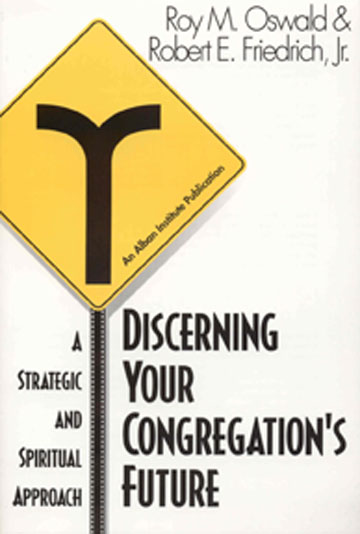Roy M. Oswald and Robert E. Friedrich, Jr., Discerning Your Congregation’s Future: A Strategic and Spiritual Approach. Alban Institute, 1996.
Referenced in: Strategies for Church Renewal – Strategic Planning, Congregational Discernment
LifeandLeadership.com Summary
This is a brief, well-written, directive guidebook to strategic planning as a spiritual practice by seasoned practitioner-scholar-consultants from the Alban Institute. It assumes the polities and structures of mainline Protestant denominations, but the approach adapts nicely to more evangelical faith traditions.
This guide to church renewal definitely fits the category of strategic planning through congregational discernment. This is outlined carefully in chapter 1 which helps readers assess whether this is right approach for their setting. It is distinguished from more leader-directed strategic planning models (see examples in the Resource Guide) where the leaders have a fairly good idea of what they want to accomplish but then use various means of gaining congregational feedback and buy-in. The assumption of this volume is that the work should start with the people, with leaders as facilitators who guide the congregation into realizing and implementing a congregationally discerned future.
The authors integrate strategic planning, spiritual discernment, polarity management, whole-congregation events, team building, etc. into a ten-step process:
- Appoint a task force
- Assess the congregation’s ministry
- Reflect on the congregation’s history
- Identify the congregation’s norms
- Interview key people in the community
- (Optional) Survey the congregation to evaluate data gathered
- Prioritize the goals
- Share these priorities at a congregational meeting
- Hold a governing board retreat
- Develop a mission statement
The authors outline an approach that works in churches of all sizes, and they make suggestions throughout on how to tailor the process based on church size and orientation. They also provide a “Congregational Health Inventory” for assessing the congregation along a number of dimensions discussed in the book.
It would not take long to peruse this book to become familiar with its merits. It is not as comprehensive as some volumes on the subject, and is probably best as a supplement for practical ideas on various pieces of the planning process.
From the Publisher
Drawing on extensive consulting experience with congregations, the authors provide a step-by-step guide to congregational planning that grounds strategic planning techniques in a process of spiritual discernment. The result: members will own the vision and be eager to participate in the congregation’s calling, life, and ministry. You and your planning committee learn the theory behind the techniques, along with receiving help for addressing specific situations.
About the Authors
Roy M. Oswald is a senior consultant with the Alban Institute. A popular teacher and author, his other Alban publication include Clergy Self-Care, The Inviting Church, Personality Type and Religious Leadership, and Beginning Ministry Together.
The Rev. Dr. Bob Friedrich is president of the Ekklesia Institute. His broad personal, interim, and business experience helps him to serve congregations of many sizes and denominations in the areas of discernment, conflict management, stewardship, leadership development, and strategic planning.
***For additional information on this resource, including reviews, click the bookstore links. Check the reference at page top or the links below for resource guides on related topics.***
See Resources on Over 100 Areas of Ministry Leadership:


